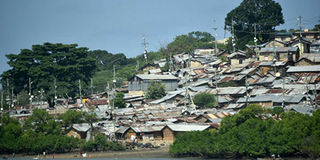Help slum dwellers cope with coronavirus effects, State told

Muoroto slum in Mombasa. Concerns have been raised over the government’s preparedness to contain a possible spread of the coronavirus in such informal settlements. PHOTO | KEVIN ODIT | NATION MEDIA GROUP
What you need to know:
- Group says restrictions could mean ‘‘financial disability and starvation’’ for a majority of Kenyans.
- Slums in Nairobi include Kibera, Mathare, sections of Dandora, Mukuru Kwa Njenga and Mukuru Kwa Reuben.
- In estates where there is no water supply, the rights group is asking the government to send water bowsers.
A human rights group is calling on the government to direct its focus on Kenyans living in the slums as the country grapples with the coronavirus (Covid-19) pandemic.
Social Justice Centre Working Group (SJCWG) argues that the government’s measures to tackle the coronavirus do not take into consideration the varying levels of need, especially those of vulnerable populations in the country.
"The Social Justice Centre Working Group is deeply concerned by the practicability of the health measures put in place," says the group in a statement, calling the measures a ''blatant disconnection'' with the reality of some sections of the population.
HEALTH GUIDELINES
According to the organisation, densely populated informal settlements may be unable to observe the government’s guidelines "even if their lives depended on it" owing to the structural challenges in the slums.
The group faulted the government for its failure to take preventive measures early, arguing that the "restriction on movement and observation of the health guidelines" could mean "financial disability and starvation" for a majority of Kenyans.
Last week, President Uhuru Kenyatta asked businesses to allow their employees to telecommute, to minimise the risk of the spread of Covid-19.
The rights group argues that while some Kenyans may work from home, for slum dwellers, a day away from work would mean no means to fend for their families.
ESSENTIAL SERVICES
''Mama mboga [offers] an essential service. Public toilets are essential services. Water vending [is an] essential service. Hawking is an essential service. Such are the wheels that drive our economy in the informal settlements," SJCWG adds.
The organisation is demanding that the government offers alternative means of survival to casual labourers.
Nairobi alone has more than five informal settlements, including Kibera, Mathare, sections of Dandora, Mukuru Kwa Njenga and Mukuru Kwa Reuben.
A 2014 UN Habitat report put the number of Kenya’s urban population living in slums at 56 per cent.
Even as the Ministry of Health emphasises on hygiene during this time, the group says that more than 80 per cent of residents in the slums have no reliable access to water and cannot afford hand sanitisers.
"The assumption that all Kenyans can access water and soap is not only ignorant but careless," the group says, calling on the government to supply these essentials to Kenyans who cannot afford them.
WATER SUPPLY
To fight the pandemic effectively, the organisation has asked the government to restore water supply to all slums and to crack down on water cartels that extort Kenyans.
In estates where there is no supply, the rights group is asking the government to send water bowsers.
On hygiene, the group wants the Ministry of Health to provide free or subsidised sanitisers, and to equip health centres with testing kits, trained personnel and ambulances to handle emergencies.
Further, the group wants the government to control prices of basic commodities such as foodstuffs and to provide relief food where necessary.
To address panic and fear among Kenyans, the group wants the government to facilitate robust public education on the coronavirus pandemic to boost preparedness.





